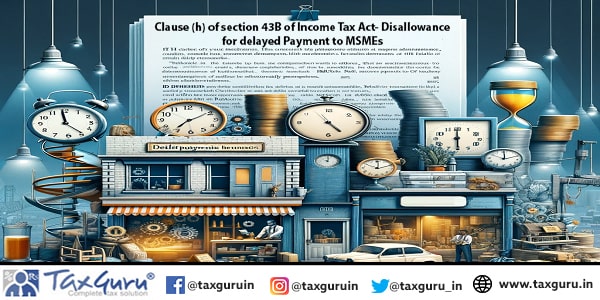Introduction: Section 43B of the Income Tax Act plays a pivotal role in the realm of business taxation, particularly in dictating the terms under which certain business expenses are eligible for deduction. This provision mandates that certain expenses can only be claimed as deductions in the fiscal year they are actually paid, not merely when the obligation arises. The Finance Bill 2023 introduces a significant amendment to this section, specifically targeting transactions with Micro, Small, and Medium Enterprises (MSMEs). The amendment aims to ensure that businesses make timely payments to MSMEs by disallowing deductions for any delayed payments. This move is designed to bolster the financial health and sustainability of MSMEs, crucial players in the economic fabric of the nation. By examining the intricacies of this amendment, including the definition of micro and small enterprises and the prescribed time limits for payments under the MSMED Act, we gain insight into the legislative intent to support these entities through tax policy.
To promote the economic growth and wellness of micro and small entities specifically, the clause (h) was introduced in section 43 b to avoid delayed payments through disallowance of expenses. New clause as per the Act:
any sum payable by the assessee to a micro or small enterprise beyond the time limit specified in section 15 of the Micro, Small and Medium Enterprises Development Act, 2006 (27 of 2006),

Such payments shall be allowed (irrespective of the previous year in which the liability to pay such sum was incurred by the assessee according to the method of accounting regularly employed by him) only in computing the income referred to in section 28 of that previous year in which such sum is actually paid by him.
Provided that nothing contained in this section [[except the provisions of clause(h)]] shall apply in relation to any sum which is actually paid by the assessee on or before the due date applicable in his case for furnishing the return of income under sub-section (1) of section 139 in respect of the previous year in which the liability to pay such sum was incurred as aforesaid and the evidence of such payment is furnished by the assessee along with such return.
Meaning of Micro enterprise and Small enterprise for the purpose of this section-
Micro enterprise A micro enterprise is a company with an investment in plant and machinery not more than 1 crore rupees and annual turnover does not exceed 5 Crore Rupees.
Small enterprise A small enterprise is a company with an investment in plant and machinery not more than 10 Crore Rupees and annual turnover does not exceed 50 Crore Rupees.
Time limit prescribed in the section 15 of MSMED Act. Section 15 of MSMED Act, 2006 provides where any supplier, supplies any goods or renders any services to any buyer, the buyer shall make payment on or before the date agreed upon between him- If written agreement exists maximum period allowed is 45 days from the date of delivery of goods or services. If no written agreement exist and no objection raise by the buyer than period would be 15 days from the date of delivery of goods or services.
Further section 16 of MSMED Act provides where the buyer fails to make payment of the amount to the supplier, he shall be liable to pay compound interest with monthly rests to the supplier on that amount at three times of the bank rate notified by the Reserve Bank. Interest shall be calculated from the date of appointed day.
This clause shall be effective from 1st April 2023.
Conclusion: The amendment to Section 43B of the Income Tax Act, set to take effect from April 1, 2023, represents a thoughtful legislative effort to fortify the economic standing of MSMEs within the Indian economy. By making the deduction of business expenses contingent upon the timely settlement of dues to MSMEs, the government sends a clear message about the importance of these enterprises. This change not only encourages prompt payments, thereby enhancing the cash flow to MSMEs, but it also aligns with broader objectives of economic equity and support for small-scale industries. As businesses adjust to this new provision, the broader impact on the MSME sector and its contribution to economic growth and development will be an area of keen observation and interest.




